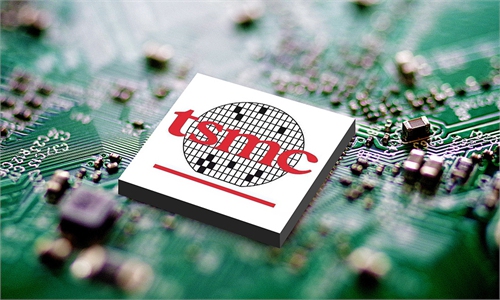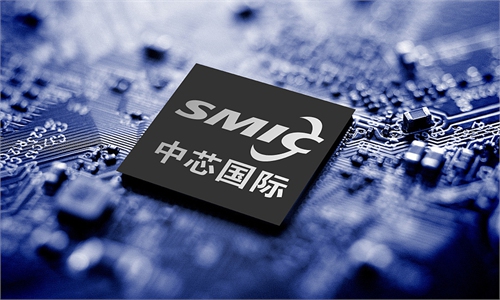China calls US 'hysterical' after new tech ban on Chinese firms
Washington 'hysterical,' reckless to endanger global industry chain: official

Workers make chips at Anhui Dongke Semiconductor Co in East China's Anhui Province on Saturday. The company is located in the Anhui Ma'anshan Economic and Technological Development Zone, and it is mainly engaged in the design, production and sales of green power chips. Photo: VCG
Chinese officials and analysts on Thursday excoriated the US government's latest crackdown on a dozen Chinese high-tech companies, saying the US has become hysterical and reckless in putting not just Chinese companies' interests at risk but also endangering the global industrial supply chain.
The US put 12 Chinese high-tech companies on its export blacklist, also known as the Entity List, on Wednesday US time, according to a statement from the US Commerce Department's Bureau of Industry and Security (BIS), blocking US businesses from selling materials or equipment to them.
Many of the 12 firms are mainland chip manufacturers or developers, such as Hunan-based Hunan Goke Microelectronics, Sichuan-based New H3C Semiconductor Technologies Co and Suzhou-based Yunchip Microelectronics. The companies' businesses also cover some other technological areas such as facial recognition and quantum information technology.
Excuses used by the US in imposing the sanctions mainly focus on allegations that those companies have links to the Chinese military, as the US claimed that many of the targeted Chinese companies support the military modernization of the People's Liberation Army and/or acquire US-origin items in support of military applications.
The move drew fierce criticism from Chinese officials on Thursday.
Shu Jueting, a spokesperson for the Chinese Ministry of Commerce, said that the rollout of the new Entity List does not conform to the consensus reached between the top leaders of China and the US, and goes against both China-US relations and the safety of global supply and industrial chains.
Chinese Foreign Ministry spokesperson Zhao Lijian also scolded the US government for becoming "hysterical" during a routine press conference on Thursday when he commented on the move.
"The US has repeatedly generalized the concept of national security and cracked down on Chinese companies by abusing its state power. The action has seriously hurt Chinese firms' interests, broken the international order and free trade rules, as well as seriously threatened the global industry and supply chains," Zhao said.
Zhao urged the US to correct its mistake immediately, and said that China retains the right to take necessary countermeasures against the US.
Some of the Chinese companies shrugged off the US' move, saying it will not have a major impact on their operations.
Hunan Goke Microelectronics published a statement on Thursday, saying that the company is actively coping with potential risks arising from the incident. But the company's products and services won't be directly impacted.
QuantumCTek Co, one of the 12 sanctioned firms, also said in a statement on Thursday that its inclusion on the list would not impact the production, sales and services of its current products. The company's businesses are proceeding stably, operations and financial situation are normal, and the impact of the incident on the company's business is controllable in general, it said.
The US move to add new Chinese chip firms to its export blacklist followed its earlier efforts to crack down on Chinese tech giants like Huawei Technologies and dozens of its affiliates. But it also came after some signs of progress appeared in the deadlocked China-US relations, after top leaders held a virtual meeting recently to discuss bilateral matters, while the US also reportedly sought help from China to release oil reserves.
Bai Ming, deputy director of the International Market Research Institute at the Chinese Academy of International Trade and Economic Cooperation, said that an economic recovery from the COVID-19 pandemic needs the coordination of industry chains among various countries, and the US' practice of cutting off industry chains will backfire on its own economy and cause US enterprises to lose the big Chinese market.
"The new sanctions are an intensified practice to restrict Chinese high-tech enterprises. China will not be easily suppressed, but will develop its own integrated circuits. In a few years, the US will certainly regret its current action," Bai told the Global Times on Thursday.
According to independent tech analyst Xiang Ligang, the US once moved its chip manufacturing bases overseas for environmental protection reasons, but now it is desperately trying to move the industries back, for fear that it would lose control over them.
"It fears losing its only card to bargain with China once China's chip industry thrives on overseas parts and technologies. It also fears that China would stop buying US chips once China learns to produce the chips itself, which would cause a loss of hundreds of billions of dollar to the US," Xiang told the Global Times.
The US government has also asked for supply chain data from tech giants and carmakers, including Samsung, Apple, BMW and the Taiwan Semiconductor Manufacturing Co (TSMC), according to a report by the South China Morning Post in October.
Xiang noted that it's an inevitable trend that China will develop its own chips even with US sanctions, as the Chinese government puts strategic emphasis on the industry, adding that China's chip production technologies will continue to improve.




